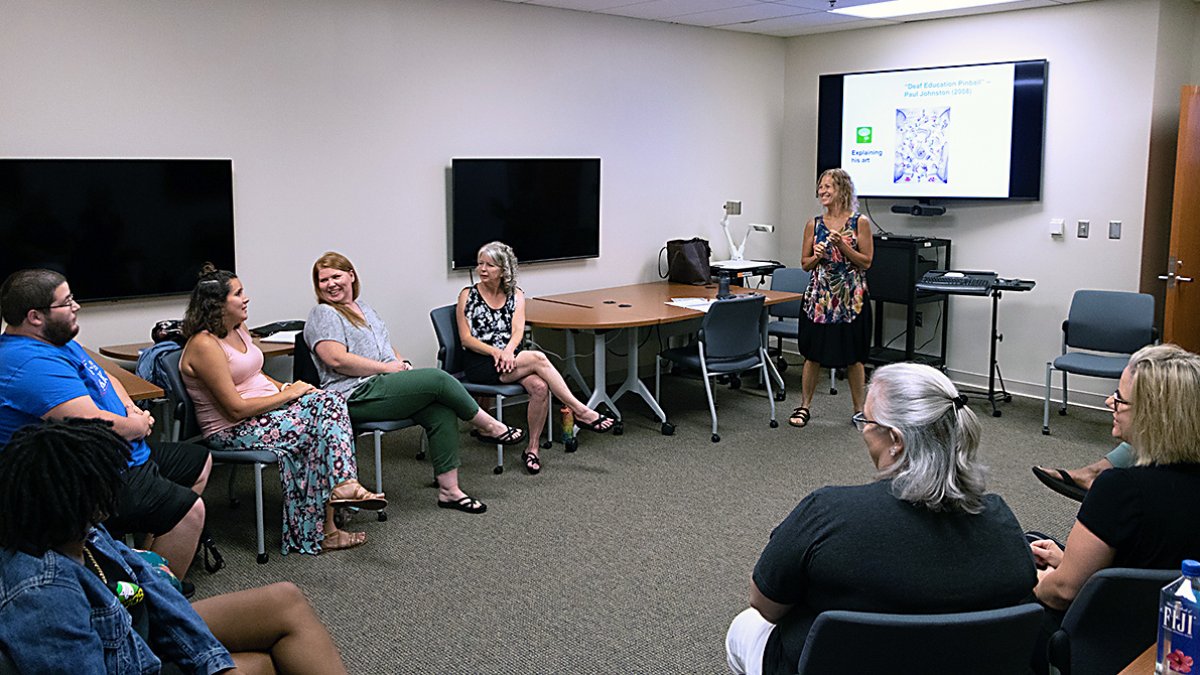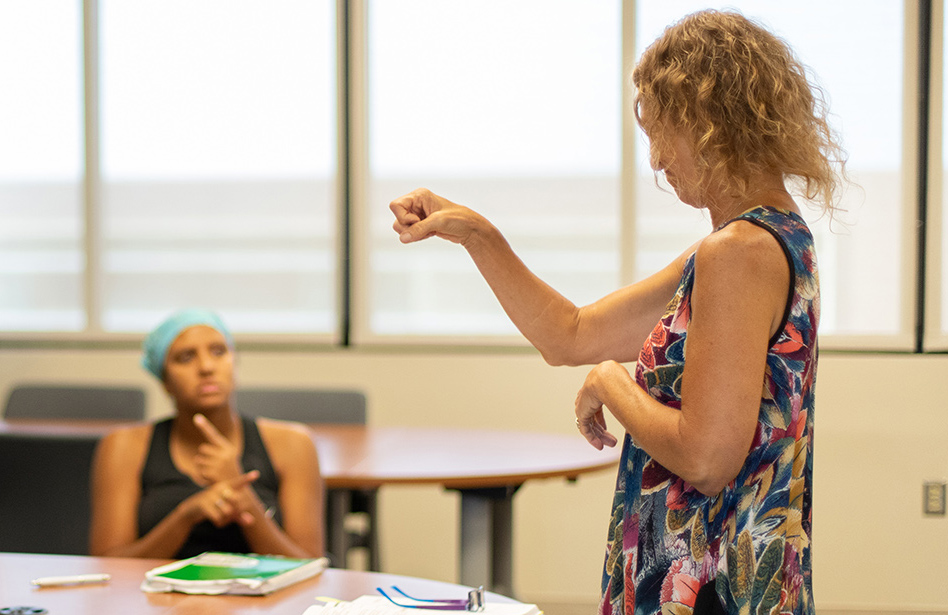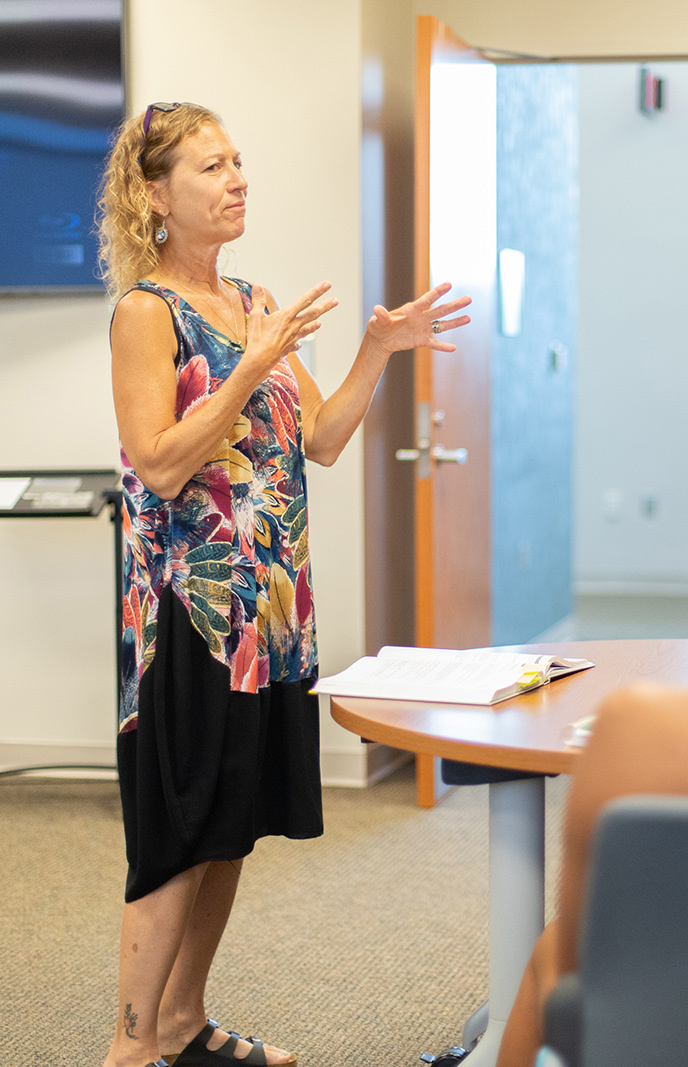Communicating Sameness: New American Sign Language professor aims to change perspectives toward Deaf community

Researcher, teacher, author, mother, world traveler and kayaker.
New American Sign Language and Deaf Studies (ASLD) Professor Petra Horn-Marsh manages to be all of these. She is a joyful person with a passion for working with the Deaf community. Horn-Marsh is teaching the first courses in the new ASLD bachelor’s degree program launched this fall at KU Edwards Campus (KUEC). Stacey Storme, associate professor of the practice for ASLD, said Horn-Marsh brings a wealth of knowledge and experience to the new program.
“Dr. Petra's vast experience over the past 30-plus years working with a variety of learners - Deaf, hearing, children, adults, heritage language users, second language learners - equips her with both the experience and knowledge to continue growing our program,” Storme said. “As a Deaf, heritage language user herself, she brings critical perspective to building this program as an opportunity for all learners to honor and explore the cultural and linguistic experiences of Deaf people as they navigate living in a society heavily rooted in auditory ways of being and therefore often experiencing oppression and discrimination.”
Horn-Marsh said she hopes her experience helps her impact the perspectives of hearing individuals towards the Deaf community. This semester, she is teaching ASL V and a class titled Intersectionality and the Deaf Communities.
“While I am enjoying teaching both courses, I am especially appreciating the diverse perspectives and experiences we are exploring in Intersectionality class,” she said. “I have two students who are from a social work background who don’t know ASL, don’t know anything about the Deaf community, but just decided to take this class, and that is exciting. There are no classes like this anywhere. It was modeled from a women’s study course and dissects different identities and layers that the Deaf communities have that overlap and intersect – whether it’s race, religion, hearing or deaf parents, gender identity, fluency of ASL, among other types of oppression. There is a long list of layers and it’s important to know how we interact and intersect with those layers.”
Her path to KUEC has taken Horn-Marsh across the country and through incredible learning experiences. But she believes her new position at the KU Edwards Campus is a perfect fit for her.
“The opportunities for expanded collaboration with Kansas School for the Deaf (KSD), the Deaf community and JCCC [Johnson County Community College] are exciting,” she said.
She was originally drawn to the Midwest by her previous position as a bilingual specialist at KSD, located in Olathe, Kansas. During her first year, she also taught ASL at Olathe Northwest High School.
KSD was established in 1861 as the first school for deaf children and remains the oldest in the state. During her 15-year tenure there, she also served as an elementary/early childhood head teacher and extended school year director. While working at KSD, she was also an adjunct professor at her alma mater, Gallaudet University, the University of North Florida and JCCC, teaching ASL both in the classroom and online. Additionally, she has served as a consultant to a few schools for the deaf in the central region of the U.S. She said she loves consulting and working with schools to offer professional development opportunities for their faculty and staff to strengthen their bilingual education pedagogy.
“This work has allowed me to continue my research and teaching efforts,” Horn-Marsh said. “KSD is among the strongest ASL/English bilingual schools in the nation. I love the students and the staff at KSD and I truly miss seeing them every day.’”
Her work at KSD and leading a deaf mentoring program for the state of Utah are two of her experiences she said will lend her the most help with her new position at KUEC.
“These experiences gave me the opportunity to work with a broad range of people - parents, children, staff, community – along with other educators of the Deaf in the country,” Horn-Marsh said. “During my tenure at KSD, I had the chance to work with Gallaudet University and other deaf schools nationwide as a consultant. Those networking opportunities helped expand my ability to make a larger impact on helping other people learn to work with the Deaf community through a variety of careers.”
So far, she said she can’t say enough thanks for the support she has received during her start at the KU Edwards Campus.
“I appreciate everyone here so much. They’ve been so welcoming to us here at KU Edwards,” she said. “The support system here is phenomenal. KUEC is very student-centered and is committed to providing students comprehensive support as they navigate their education. I am impressed by the creativity and out-of-the-box thinking shown here at KUEC.”
Early Career — assisting renowned scientists & making a difference

Horn-Marsh considers both Chicago and San Diego her hometowns, having grown up in the first and settling into the second for most of her life.
“I moved around a lot growing up,” she said. “When I was 9 years old, we moved to California and I went to mainstream school there and hated it. I did that for two years and then I was able to go to the deaf school in Riverside, California, where I thrived due to direct instruction, peer interaction and access to a variety of extra-curricular activities.”
Horn-Marsh continued her formal education at the renowned Gallaudet University in Washington, D.C., where she earned her Bachelor of Arts in Secondary Education and History.
“Gallaudet is the only liberal arts university for deaf students in the world,” she said. “There is a significant population of international students. It is truly one of a kind; known as a mecca of the Deaf world.”
Horn-Marsh planned to become a social studies teacher for deaf students when she started college. But plans changed. Upon graduation, she was asked to serve as a research assistant to research scientists Ursula Bellugi and Karen Emmorey near her hometown in La Jolla. Bellugi was the director of the Laboratory of Cognitive Neuroscience at the Salk Institute for Biological Studies and is regarded as the founder of the neurobiology of American Sign Language. Horn-Marsh took what was supposed to be a six-month assignment but stayed for two years.
“Dr. Bellugi just immersed herself in studying the brain,” Horn-Marsh said. “She studied the brains of native ASL signers – both Deaf people and CODAs (children of Deaf adults). She compared those findings with her studies of Deaf and hearing people who learned ASL later in their lives. She specifically looked at how brain processes and speed of error recognition worked in ASL comprehension and production.”
Bellugi’s research found that the left hemisphere of the human brain has an inherent tendency for language, including signed language, without being connected to the sounds of speech.
“Historically and even to this date, audiologists and speech pathologists would tell parents of deaf children that they should not allow their children to use sign language because if they did their child would never be able to speak,” Horn-Marsh explained. “This is false. Research has shown providing Deaf children the opportunity to learn sign language before using English provides them meaningful language and communication input that is fully accessible to them visually. This provides Deaf children with a necessary foundation of grammar, vocabulary and linguistic structure from which they can begin learning their second language – written English. Because written English is visual, like ASL, all Deaf children need to learn this for use in their daily lives. Since spoken English is auditory, it is not reasonable to expect every Deaf child to develop speaking skills. Just as basketball is a learned skill, learning to speak is a skill for Deaf children. It is not a safe assumption that all can learn the skill to speak; just as not all people can learn to play basketball well.”
Horn-Marsh is grateful for the rich learning opportunities granted to her while working with Bellugi.
“I learned so much about ASL because, ironically, deaf students like me didn't have any formal ASL classes like the hearing people did,” she said. “The research we did laid the foundation for critical work we are doing today that provides Deaf people access to formal education in their own language of ASL.”
During this time, Horn-Marsh also accepted a position as an adjunct professor at San Diego Mesa College.
Along with the rest of the world, Horn-Marsh embraced these new findings and took them to Utah State University (USU) in her next role as a state-wide diagnostician for the Deaf Mentor Project at Ski*High Institute. USU acquired research grants focusing on families in the state with young children. Here she evaluated Deaf children up to age 6 on linguistic acquisition in ASL and Signed English while working on her doctorate studies in sociology and as an ASL adjunct instructor.
“With the grant, they wanted to certify that early intervention in ASL first and in English literacy for all deaf infants, toddlers and children, as well as spoken English as an additive for those who had enough auditory access for these youngest children and their parents, was viable and appropriate. At the end of the grant, the Deaf Mentor Project became a state-funded program at Utah State Schools for the Deaf,” Horn-Marsh said. “I became the first specialist in Utah traveling state-wide to meet with parents and children who were newborn to 8-years-old. I also supervised and provided extensive support to deaf mentors in their work with families. Our work had a positive impact on the parents as they became accepting of their deaf children, without pitying. They came to see having a Deaf child the same way they saw their hearing children.”
Horn-Marsh said working as a Deaf Mentor Specialist was one of her favorite jobs.
“I witnessed families learning sign language, learning how to communicate with their deaf babies and it was phenomenal,” she said. “Those kids went to kindergarten academically ready to learn. They also had self-confidence and self-esteem as deaf students.”
While at USU, Horn-Marsh earned her Master of Arts in History with the thesis: "Silent Saints: Deaf Mormons in Utah," as well as her Doctor of Philosophy in Sociology with the dissertation: “The Effects of Family and Education Backgrounds on the Self-Identification of Deaf and Hard-of-Hearing Persons in Utah.”
Ready for a new challenge and loving her role as a teacher to students, parents and other teachers, Horn-Marsh was attracted to the Midwest opportunity at Kansas School for the Deaf.
Family Life — born of immigrants and building a family of her own
Horn-Marsh was born deaf of deaf parents who immigrated to the United States from Germany before she was born.
“It was a surprise that I was deaf, so it was even more of a reason for them to stay here in America,” Horn-Marsh said. “In America, deaf individuals were allowed to progress with education and employment in ways Europe didn’t have.”
One of five children in a blended family, Horn-Marsh has three hearing half-siblings and one deaf sibling. Horn-Marsh traveled to Germany often to visit grandparents and relatives during the summer months while she was growing up.
“My first language is DGS or German Sign Language,” she said. “I originally learned ASL here in the United States through friends and the Deaf community.”
She said her parents learned ASL in the U.S., but they still have German accents when signing ASL.
“So people will see them sign and know that they're not Americans,” she said with a laugh. “Just like hearing people have dialects in their speech, ASL is a second language to my parents.”
Horn-Marsh married a man who is referred to in the Deaf community as a CODA - someone who is hearing and has deaf parents. Together, they have five children who are now living across the U.S., two of whom are deaf and three hearing. Her youngest, an 18-year-old, is attending classes at JCCC. Her oldest is a 35-year-old attorney in the U.S. Army stationed in Hawaii. In between, they have a 33-year-old son who is a restaurant server in Washington, a 22-year-old senior at Gallaudet University and a 20-year old son living in Olathe, Kansas.
Horn-Marsh said the entire family loves getting together for trips, which fuels her love for adventure and travel.
“One memorable trip that we all had was a fantastic week in Tobago, near Trinidad,” Horn-Marsh said. “It was an absolutely wonderful experience especially for the kids, traveling outside the country as well as being exposed to a different culture. Now the kids have all become travelers themselves!”
Future Plans — Building American Sign Language at KU Edwards
Horn-Marsh brings all of her enthusiasm for life and adventure along with her extensive skills, education and experience to KU Edwards Campus as a professor for the new American Sign Language & Deaf Studies bachelor’s degree program classes. She has big plans for the students at KUEC as well as the Deaf community in the region and in the country including:
- Expanding the employment possibilities for those who are interested in working with Deaf people, so they are not limited to only becoming an interpreter or becoming a classroom teacher. “Thinking outside the box, there are so many other possibilities from social work to speech-language pathologists, and even the possibility of developing an ASL specialist licensure,” she said.
- Working with the Deaf population to encourage them to take ASL and Deaf studies courses at KU Edwards Campus. “It could become a minor or a certificate giving Deaf students more options for employment. Kansas City has one of the largest Deaf communities in the Midwest — even the United States,” she said.
- Awareness. “Deaf people will have greater access and equity by the greater public having more awareness and sensitivity; whether it be those serving Deaf individuals at a store, a restaurant, the doctor’s office, in a wide variety of settings,” she said.
Horn-Marsh said she looks forward to the ASLD program expanding and growing by “having a life of its own.” Through the process of expanding and educating, Horn-Marsh is hoping to change the perspective of the hearing and Deaf communities.
“I want everyone to see Deaf people as equals; being deaf is not something to pity,” she said. “I want hearing people to gain more awareness of Deaf culture and a greater understanding of the importance of providing communication access in a society heavily based in auditory and speaking norms.”
If you’re interested in the American Sign Language & Deaf Studies degree and certificate programs at KU Edwards Campus, contact Academic Success Coach Nigyar Alves at 913-897-8556 for more information.
Getting to Know Dr. Petra

- Favorite Starbuck’s order? A cafe mocha with two shots of espresso and coconut milk or whole milk — Starbucks is a no-no. :)
- Favorite quote or saying to live by? "Carpe diem!"
- Your spirit animal? Right now, it’s a ladybug
- One thing not many people know about you? My first language is Deutsche Gebärdensprache (German Sign Language)
- Pets you own or would like to own? I have a 9-year-old blue heeler and a 5-year-old Great Dane, but I also keep a 4-year-old black lab mix until our daughter finishes college in May 2020!
- Favorite pastimes? Reading, traveling, kayaking
- Dream vacation? World travel with my husband and/or family/friends
- Favorite past vacation? There were two. One was my honeymoon trip to Mexico City where we both actually presented at a teacher for the deaf conference for five days and did our honeymooning afterward. We met some amazing Deaf individuals and teachers of the deaf and had so much fun! The other was a trip to Costa Rica with a group of old college friends from Gallaudet. We’re already planning our next get together here in the U.S.
- How do you spend your summer breaks? Kayaking with my husband, going on trips with my family and friends, swimming.
- Favorite spot to kayak? Arkansas River in Buffalo National Park — the bluffs are gorgeous, the river water is warm, it’s just the best!
- Your favorite book and/or movie? Movie — Interstellar. Book — Huck's Raft by Steven Mintz
- If you won the lottery and decided to give up teaching, what would you do instead? Give some money to ASL Curriculum Instruction & Assessment for curriculum development and research work and world travel with some money invested!
Top photo: Dr. Petra Horn-Marsh teaches Intersectionality and the Deaf Communities class at KU Edwards Campus as part of the new American Sign Language and Deaf Studies degree programs.





